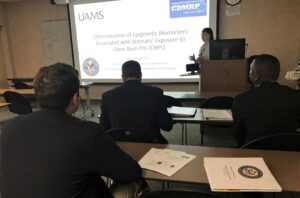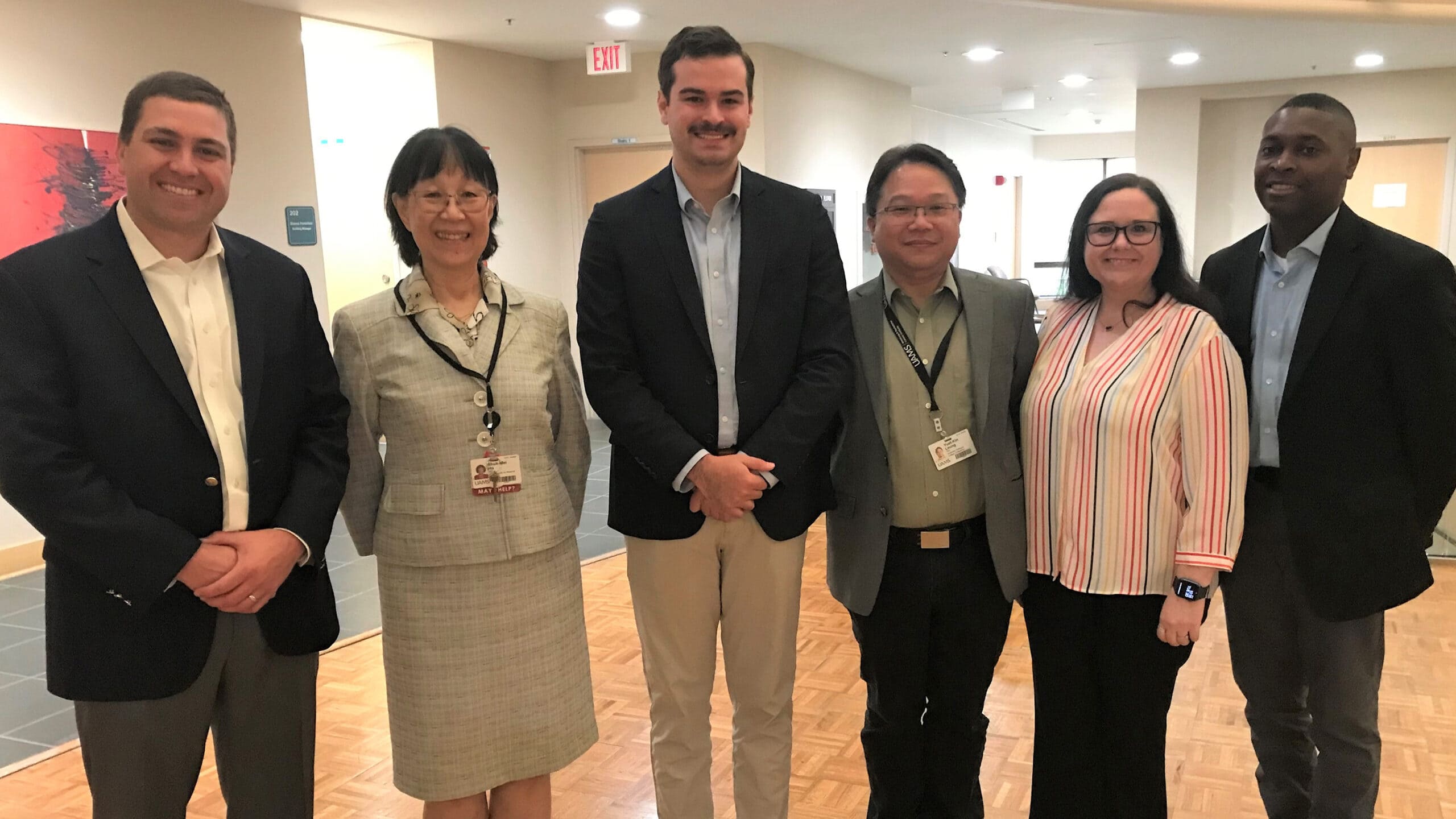Lawmaker’s Staff Visits UAMS to Learn More about Research of Veterans’ Exposure to Burn Pits
| During a recent visit with University of Arkansas for Medical Sciences (UAMS) researchers, Patrick McGuigan from U.S. Sen. John Boozman’s office said the research team’s newly funded project will help ensure that veterans who were exposed to open burn pits receive appropriate health care.
Shuk-Mei Ho, Ph.D., UAMS vice chancellor for Research and Innovation and co-principal investigator on the study, presented an overview of the project and answered questions from McGuigan and two other staff members from Boozman’s office.

UAMS’ Shuk-Mei Ho, Ph.D., provided an overview of the burn pit exposure research to members of Sen. John Boozman’s staff.
“Senator Boozman greatly appreciates the research being conducted at UAMS and the Central Arkansas Veterans Healthcare System,” said McGuigan, Boozman’s military legislative assistant and a veteran who served in both Iraq and Afghanistan as a U.S. Army field artillery officer.
More than 300 Arkansas veterans will become part of the new study conducted by UAMS and the Central Arkansas Veterans Healthcare System (CAVHS) to determine if exposure to open pit burning and molecular-level changes are associated with chronic health conditions. The four-year, $2.9 million Department of Defense (DOD)-funded study will test for persistent organic pollutants in blood and heavy metals in urine, which the researchers hypothesize remain from burn pit exposure. The team will also look for modifications (methylation) in DNA that can cause long-term health problems for the veterans, including epigenetic changes that can be passed to their offspring.
Announced in June, the DOD grant news release is here.
The Department of Veterans Affairs and DOD estimate that 3.5 million service members were exposed to open burn pits used for waste disposal during military deployments in Southwest Asia since 1990.
“Senator Boozman thinks this is incredibly important,” McGuigan said. “Veterans deserve the benefits and health care that they’ve earned. He believes the research is part of the process of getting a better understanding of what kind of illnesses come out of some of these deployments so that we’re better situated to care for veterans in the long run.”
Ho thanked the Boozman staff for giving her team the opportunity to discuss the project.
“At UAMS, our mission as biomedical researchers is to help improve health and health care, and this is a great example of how we can do that,” Ho said. “We are especially proud to be part of a project that can help so many veterans who have sacrificed for our country.”

A map as part of the presentation shows the number of veterans in Arkansas and surrounding states who have filled out the VA’s Open Burn Pit registry in the past 10 years.
Ho and UAMS’ Kalpana Padala, M.D., the study’s co-principal investigator at CAVHS, will recruit study participants from about 6,800 Arkansas veterans who registered in the Veterans Affairs Airborne Hazards and Open Burn Pit (AHOBP) Registry. The study aims to enroll 220 of those registered veterans exposed to burn pits while on Middle East deployments and another 110 veterans not exposed.
Ho said it is important that all veterans who served in the Middle East fill out the VA Registry Form, even those who believe they were not exposed to burn pits. All veterans who complete the form are eligible for a free environmental health evaluation at their local VA.
The visit from Boozman’s office follows Congress’ recent passage of the PACT Act, a new law the senator helped pass that expands Department of Veterans Affairs health care and benefits for veterans exposed to burn pits and other toxic substances. The law helps provide veterans and their survivors with care and benefits.
